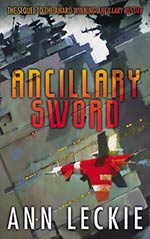
![]() bazhsw
bazhsw
2/17/2016
![]()
I really enjoyed Ancillary Justice and found it fully deserved all the plaudits and recognition it received upon release. Seeing Ancillary Sword put in a 'not too shabby' performance in pulling further awards and nominations I was keen to pick up with this series.
I'm going to give this book a cautious thumbs up. I can't help but feel that many of the reviews praising this book are really riding on the crest of a wave of the genuinely creative ideas of the first book. That said, for any criticism in this review I do want to read more and will almost certainly pick up Ancillary Mercy at some point.
Esk One Seventeen is no longer an ancillary of 'Justice of Toren' and she is no longer one of thousands (or thousands of one perhaps would be more appropriate). She is no longer a spaceship or an ancillary. Following on from the personality splitting cataclysm of Aanander Minaii (the tyrant of Radch universe) in the first novel Breq is now 'Fleet Captain Breq', with command of her own ship, 'Mercy of Kalr'. If she's on the side of the 'slightly good version' of Minaii, she isn't exactly working for her. One version of Minaii is seeking to remove ancillaries (essentially frozen human beings implanted in order to be controlled by the intelligence of the spaceship). Breq being both an ancillary and a ship understands this and is in line with this idea.
For reasons that are not entirely clear she goes to Athoek station, essentially a space station and planet with a whole bunch of annexed societies working as slaves or indentured workers to the Radch Empire. SMASH SMASH SMASH! Here is Ann Leckie's hammer to tell us colonialism, slavery and racism is BAD! Yep, I get all of that but this books message seemed to dominate the plot to the point of boredom and eye rolling. It was almost 'two legs bad, four legs bad' and of course in the spirit of all privileged campaigners it is the oppressors society that 'leads' the oppressed into their awakening. And this is what bothers me a little - Breq hardly has to try hard to get anything done - it's 'do this, I order that' and of course with a ships omnipresence, nothing is really hidden from her. Apart from being 'not quite as powerful as I once was' I really didn't pick up on any of Breq's inner struggle. I pretty much despise the 'Puppies' in SF fandom (and hey, the alternative to political correctness is being politically wrong) but I can see how the terribly simplistic handling of oppressed groups can annoy some.
Of course, the Radch Empire is reminiscent of the Roman Empire - including it's snazzy dress sense and deliverance of civilisation across humankind. It annexes planets and society, imposes it's language, culture and religion on those it 'helps' and is not opposed to genocide. It is a military jackboot stamped on the throat of it's victims. Leckie picks up admirably where she left off in the first novel and we learn quite a lot more about the society. Leckie has built up a coherent, realistic universe and created a culture which is understandable yet still remains 'other worldly'. I'm looking forward to learning more about Radch society in the final book.
I appreciated the development of the gender pronoun 'She'. In Radch society there is no masculine pronoun and everyone is 'she', 'her'. 'mother', 'daughter' etc. I spent much of the first novel imagining which characters were biologicaly male or female. I really didn't bother this time and that is to the credit of Leckie - it feels authentic and real. Even when it becomes clear a couple of characters have penises I think the 'she' pronoun sounds 'just right' for this civilisation.
As for plot, well there is a lot of drinking tea and eating with the political and merchant class of Athoek, there's a lot of unvealing the inequality in this system and then there is more tea. Nothing really happens until near the end and a specific incident that actually woke me up into realising I was reading a novel.
I'm still interested in this series but it is a disappointing follow up from the excellent Ancillary Justice.